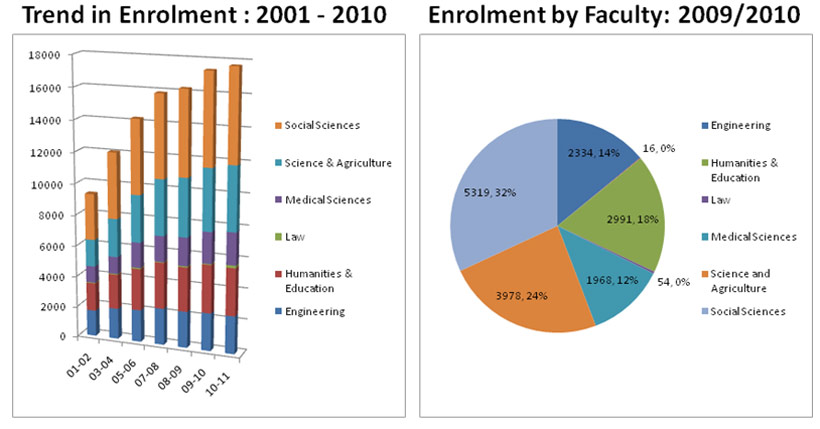 |
 |
 |
|
May 2011
|
Reporting to the Campus CouncilA fundamental aspect of the accountability of The University of the West Indies is the annual meeting of the Campus Council, where Annual and Faculty Reports are presented. For the St. Augustine Campus, this meeting took place on March 29, and there, Pro Vice Chancellor and Principal, Prof Clement Sankat gave an account of the previous year’s activities. The 2009/2010 academic year marked the 50th anniversary of the St. Augustine Campus as a part of The UWI. Among the areas highlighted by Prof Sankat to the Campus Council, were the following. ACCREDITATION In mid-2009 the Campus started its institutional accreditation process. The Campus had registered with the Accreditation Council of Trinidad and Tobago (ACTT) in 2008, becoming one of the first tertiary institutions of its size and reach to bid for institutional accreditation. The process was completed by the end of 2010 and was used as an opportunity to conduct a self study assessment of its entire operations within the framework of the UWI Strategic Plan, 2007-2012 and against the background of the specific accreditation criteria and standards. The Accreditation was received in May 2011 for a seven-year period. STUDENTS Total enrolment on the Campus climbed to 17,656, an increase of more than 8%. The largest rate of increase was in the Faculty of Law which doubled in size from 80 students in the previous year to 166 in 2009/2010. The Faculty of Medical Sciences grew by 11% while the Faculty of Science & Agriculture and the Faculty of Social Sciences both grew by 9%. The Campus participated in institution-wide instruments such as the Speak Your Mind student experience survey, and an Employer Survey to acquire employer feedback on the graduate skills and attributes that the employers considered the most important and the extent to which UWI graduates demonstrated them. For the first time a survey on the Prevalence of Alcohol Use Disorders was done on the Campus. The information from this survey will inform future policies on the availability of alcoholic substances on the Campus and the further development of health services. STAFF Wage negotiations with the two entities representing staff at various levels began for the period 2008/2010, and though difficult at times, by late 2010 a settlement was reached between the Administration and the West Indies Group of University Teachers (WIGUT), the body representing Academic and Senior Administrative and Professional (ASAP) staff. Negotiations with the Oilfields Workers’ Trade Union (OWTU), representing Administrative, Technical and Service Staff (ATSS) continued throughout 2010 and are ongoing. NEW PROGRAMMES At the Undergraduate level the Campus introduced four new programmes, including two new BA degrees in Geography and Dance. At the Postgraduate level however, there were 16 new programmes including new Diploma and MSc programmes in Sports Management, which are the result of partnerships with the world football governing body, FIFA and the International Centre for Sports Studies (CIES) based in Switzerland. RESEARCH AND INNOVATION The Campus continued to share the research output through public lectures and scholarly publications. In the review year there were six professorial lectures and five Distinguished Open Lectures including one by Nobel Prize winner in Economics, Joseph Stiglitz. One other important criterion applied by the University in assessing the level of research output is the number of works published in peer-reviewed journals or presented at conferences. During the 2009/2010 academic year the campus produced 274 peer-reviewed journal publications, 16 books, 27 chapters in books, and 258 conference presentations. OUTREACH
THE FUTURE In the midst of the 50th anniversary celebrations however, the Campus community is aware of the new realities facing higher education institutions around the world and here in the Caribbean There is always a need to explore new initiatives to meet ever increasing demands. It is with this in mind that the Campus looks forward to developments that would see an expansion of our offering with regard to the full establishment of an arm of the Faculty of Law, and a physical expansion that would satisfy the particular needs of future students in South Trinidad and on the island of Tobago.
|

